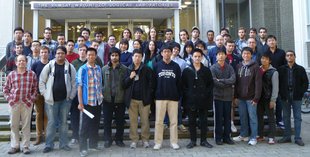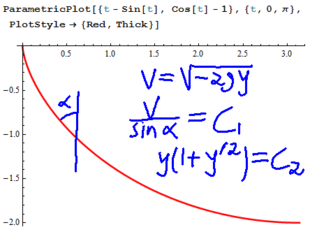12-267/About This Class: Difference between revisions
No edit summary |
|||
| Line 20: | Line 20: | ||
===Text Book(s)=== |
===Text Book(s)=== |
||
Our main text book will be Boyce and DiPrima, [http://ca.wiley.com/WileyCDA/WileyTitle/productCd-EHEP002451.html Elementary Differential Equations and Boundary Value Problems] (current edition is 10th |
Our main text book will be Boyce and DiPrima, [http://ca.wiley.com/WileyCDA/WileyTitle/productCd-EHEP002451.html Elementary Differential Equations and Boundary Value Problems] (current edition is 9th and 10th will be coming out shortly. Hopefully any late enough edition will do). It is a required reading. |
||
===Wiki=== |
===Wiki=== |
||
Revision as of 16:17, 4 September 2012
| ||||||||||||||||||||||||||||||||||||||||||||||||||||||||||||
Crucial Information
Agenda: If calculus is about change, differential equations are the equations governing change. We'll learn much about these, and nothing's more important!
Instructor: Dror Bar-Natan, drorbn@math.toronto.edu, Bahen 6178, 416-946-5438. Office hours: by appointment.
Classes: Mondays, Tuesdays, and Fridays 9-10 in RW 229.
| Teaching Assistant: Jordan Bell, jordan.bell@utoronto.ca.
Tutorials: Tuesdays 10-11 at RW 229. No tutorials on the first week of classes. |
URL: https://drorbn.net/drorbn/index.php?title=12-267.
Abstract
Taken from the Faculty of Arts and Science Calendar:
First-order equations. Linear equations and first-order systems. Non-linear first-order systems. Existence and uniqueness theorems for the Cauchy problem. Method of power series. Elementary qualitative theory; stability, phase plane, stationary points. Examples of applications in mechanics, physics, chemistry, biology and economics.
- Prerequisite: MAT157Y1, MAT247H1.
- Corequisite: MAT257Y1.
- Exclusion: MAT244H1.
- Distribution Requirement Status: This is a Science course.
- Breadth Requirement: The Physical and Mathematical Universes (5).
Text Book(s)
Our main text book will be Boyce and DiPrima, Elementary Differential Equations and Boundary Value Problems (current edition is 9th and 10th will be coming out shortly. Hopefully any late enough edition will do). It is a required reading.
Wiki
The class web site is a wiki, as in Wikipedia - meaning that anyone can and is welcome to edit almost anything and in particular, students can post notes, comments, pictures, whatever. Some rules, though -
- This wiki is a part of my (Dror's) academic web page. All postings on it must be class-related (or related to one of the other projects I'm involved with).
- You must login to edit. To get an account, email me your preferred login name, your real name and your email address if different from the address you are writing from.
- Criticism is fine, but no insults or foul language, please.
- I (Dror) will allow myself to exercise editorial control, when necessary.
- The titles of all pages related to this class should begin with "12-267/" or with "12-267-", just like the title of this page.
- For most 12-267 pages, it is a good idea to put a line containing only the string {{12-267/Navigation}} at the top of the page. This template inserts the class' "navigation panel" on the top right of the page.
- To edit the navigation panel itself, click on the word "Navigation" on the upper right of the panel. Use caution! Such edits affect many other pages! Note that due to page-caching, such edits take some time to propagate to the pages that include the navigation panel. To force immediate propagation to a given page, reload that page with the string "&action=purge" (meaning: "purge cached version") appended to the page's URL.
- Some further editing help is available at Help:Contents.
Marking Scheme
There will be one term test (25% of the total grade) and a final exam (50%), as well as about 9 homework assignments (25%).
The Term Test
The term test will take place in class and on the tutorial hour on Tuesday October 23th, 9-11AM. A student who misses the term test without providing a valid reason (for example, a doctor’s note) within one week of the test will receive a mark of 0 on the term test. There will be no make-up term test. If a student misses the term test for a valid reason, the weight of the problem sets will increase to 35% and the weight of the final exam to 65%.
Homework
Assignments will be posted on the course web page and distributed in class (usually on Tuesdays) approximately on the weeks shown in the class timeline. They will be due a week later at the tutorials and they will be (at least partially) marked by the TAs. All students (including those who join the course late) will receive a mark of 0 on each assignment not handed in; though in computing the homework grade, your worst two assignments will not count. I encourage you to discuss the assignments with other students or browse the web, so long as you do at least some of the thinking on your own and you write up your own solutions. Remember that cheating is always possible and may increase your homework grade a bit. But it will hurt your appreciation of yourself, your knowledge and your exam grades a lot more.
Good Deeds
Students will be able to earn up to 25 "good deeds" points throughout the year for doing services to the class as a whole. There is no pre-set system for awarding these points, but the following will definitely count:
- Drawing a beautiful picture to illustrate a point discussed in class and posting it on this site.
- Taking class notes in nice handwriting, scanning them and posting them here.
- Typing up or formatting somebody else's class notes, correcting them or expanding them in any way.
- Writing an essay on expanding on anything mentioned in class and posting it here; correcting or expanding somebody else's article.
- Doing anything on our 12-267/To do list.
- Any other service to the class as a whole.
Good deed points will count towards your final grade! If you got [math]\displaystyle{ n }[/math] of those, they are solidly yours and the above formula for the final grade will only be applied to the remaining [math]\displaystyle{ 100-n }[/math] points. So if you got 25 good deed points (say) and your final grade is 80, I will report your grade as [math]\displaystyle{ 25+80(100-25)/100=85 }[/math]. Yet you can get an overall 100 even without doing a single good deed.
Important. For your good deeds to count, you must do them under your own name. So you must set up an account for yourself on this wiki and you must use it whenever you edit something. I will periodically check Recent changes to assign good deeds credits. Those credits will be made public (good deeds are public as a whole) towards the end of the course, at 12-267/Register of Good Deeds.
Class Photo
To help me learn your names, I will take a class photo on Tuesday of the third week of classes. I will post the picture on the class' web site and you will be required to send me an email and identify yourself in the picture or to identify yourself on the Class Photo page of this wiki.
Accessibility Needs
The University of Toronto is committed to accessibility. If you require accommodations for a disability, or have any accessibility concerns about the course, the classroom or course materials, please contact Accessibility Services as soon as possible: disability.services@utoronto.ca or http://studentlife.utoronto.ca/accessibility.
Academic Integrity
I have been asked to include with the course syllabus a link to the Office of Academic Integrity. Here it is: http://www.artsci.utoronto.ca/osai/students.
The saddest that can happen to you in this class is if you won't notice the door being opened.



